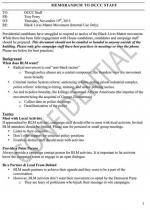Dem Memo On "Best Practices" For "Black Lives"
Candidates advised on how to deal with group
AUGUST 31--In a confidential memo to fellow staffers, the Democratic Congressional Campaign Committee’s diversity director last year outlined “best practices” when dealing with the "radical" Black Lives Matter movement, including the avoidance of phrases like “all lives matter” and “black on black  crime,” which “anger BLM activists” and are “viewed as red herring attacks.”
crime,” which “anger BLM activists” and are “viewed as red herring attacks.”
The November 2015 memo, authored by Troy Perry, notes that the document “should not be emailed or handed to anyone outside of the building. Please only give campaign staff these best practices in meetings or over the phone.”
The Perry memo was posted late Tuesday evening to the WordPress blog of “Guccifer 2.0,” the hacker who has taken credit for intrusions into the DCCC and Democratic National Committee computer systems.
Since writing the BLM memo, Perry (seen above) has left the DCCC for a job with Hillary Clinton’s campaign.
Noting that presidential candidates “have struggled to respond to tactics” of BLM, Perry advised that House candidates and campaign staff “should be prepared.”
To that end, Perry counseled that “If approached by BLM activists,” staffers should meet with group members and listen to their concerns, but not “offer support for concrete policy positions.” Perry recommended that Democrats “Be a Partner & Lead From Behind” since leary BLM members “don’t want their movement co-opted by the Democratic Party.”
On the topic of “Message,” the memo declares, “Do not say ‘all lives matter’ nor mention ‘black on black crime.’” These phrases, Perry wrote, “are all viewed as red herring attacks” and would prompt unwanted media attention and “only anger BLM activists.” Perry concluded, “This is the worst response.”
Perry suggested several talking points regarding BLM when dealing with media and activists. “A history of systemic racism continues to confront the daily lives of African-Americans,” he wrote. “The country must look for ways to address this legacy” and make sure that African-Americans are “treated with fairness and dignity.” (2 pages)






